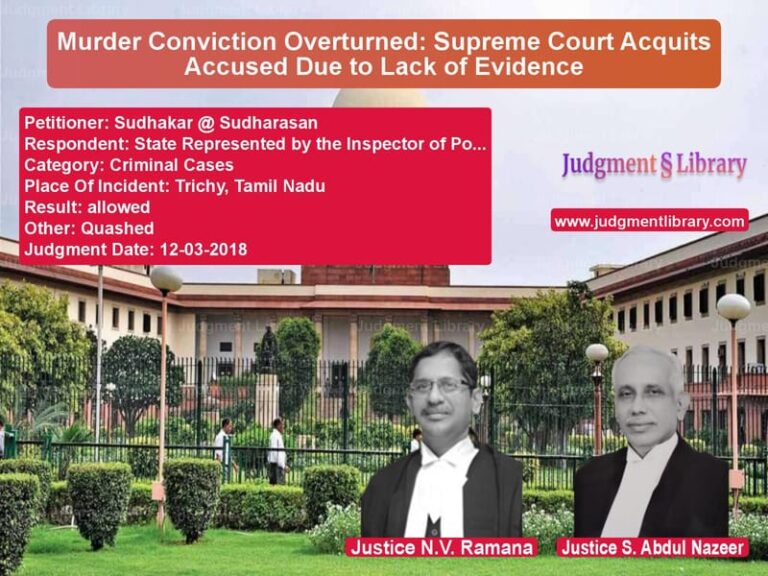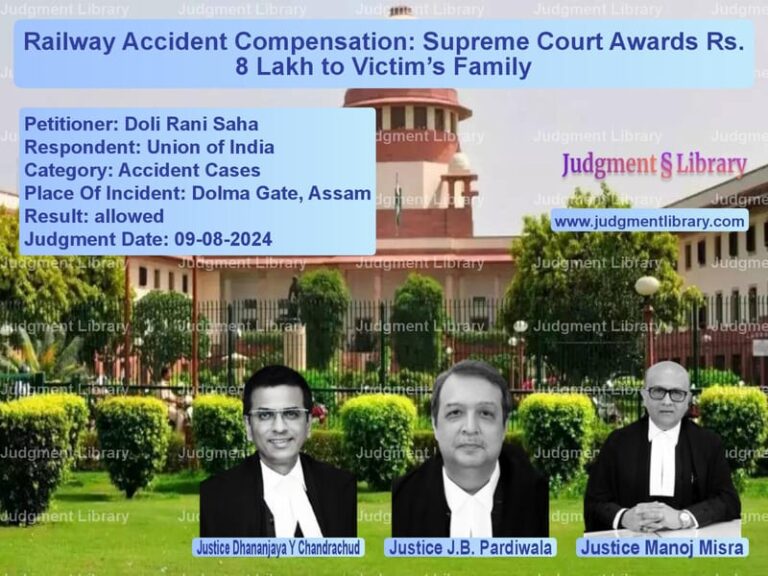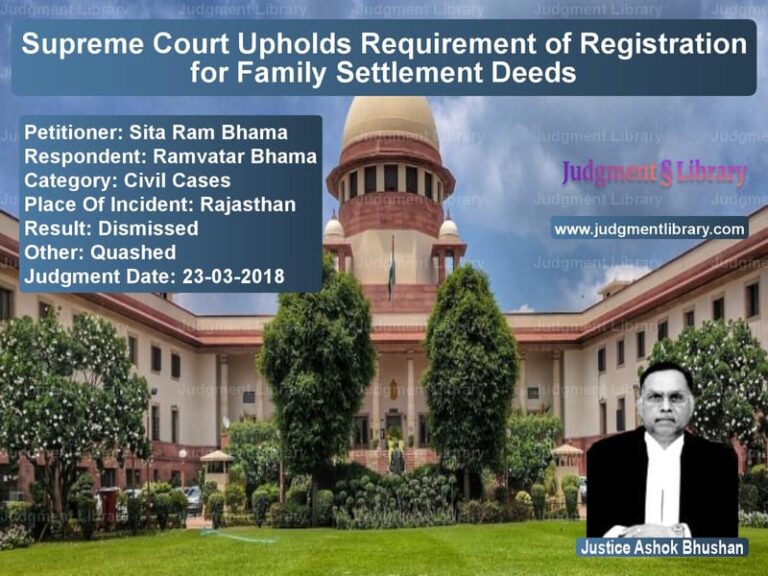Supreme Court Rules on Interim Compensation Under Negotiable Instruments Act
The Supreme Court of India has recently delivered an important judgment in Shri Gurudatta Sugars Marketing Pvt. Ltd. v. Prithviraj Sayajirao Deshmukh & Ors., addressing a critical question of law under the Negotiable Instruments Act, 1881 (NI Act). The judgment pertains to the issue of whether an authorized signatory of a company, who signs a cheque on behalf of the company, can be held liable to pay interim compensation under Section 143-A of the NI Act.
Background of the Case
The appellant, Shri Gurudatta Sugars Marketing Pvt. Ltd., entered into multiple agreements with Cane Agro Energy (India) Ltd. (hereinafter “Cane”) between September 2016 and June 2017. Under these agreements, the appellant made advance payments amounting to INR 63.46 crore for the supply of sugar. However, Cane failed to fulfill its obligations and later agreed to refund the advance amount.
To partially discharge this liability, Cane issued two post-dated cheques:
- INR 45 crore
- INR 6.64 crore
These cheques were signed by Prithviraj Sayajirao Deshmukh, the Chairman of Cane. However, both cheques were dishonored upon presentation due to insufficient funds.
Following the dishonor, the appellant issued a demand notice to Cane and its directors, including Prithviraj Sayajirao Deshmukh. When no payment was made, a complaint was filed under Section 138 of the NI Act before the Judicial Magistrate, First Class, Kolhapur.
Read also: https://judgmentlibrary.com/supreme-court-upholds-nhais-right-to-levy-toll-on-national-highways/
Legal Issues Considered
- Whether the signatory of a cheque, authorized by a company, can be considered the “drawer” under the NI Act.
- Whether an authorized signatory can be directed to pay interim compensation under Section 143-A.
- The effect of corporate insolvency proceedings on cheque dishonor complaints.
Arguments by the Petitioner (Appellant)
- The appellant argued that under Section 143-A of the NI Act, the directors and authorized signatories of a company should be liable to pay interim compensation.
- Since Cane was undergoing insolvency proceedings, the company itself could not make payments, and its directors should be held personally liable.
- The purpose of Section 143-A is to ensure relief for the payee in dishonor cases, and excluding signatories from this provision would render it ineffective.
- They relied on Aneeta Hada v. Godfather Travels and Tours Pvt. Ltd., arguing that authorized signatories effectively act as “drawers” in their representative capacity.
Arguments by the Respondent (Prithviraj Sayajirao Deshmukh & Ors.)
- The respondents contended that the liability under Section 143-A applies only to the “drawer” of the cheque.
- The term “drawer” under the NI Act refers specifically to the entity on whose account the cheque is drawn, not to individuals signing on behalf of the entity.
- Since the company, Cane, was the drawer of the cheque, only the company could be held liable for interim compensation under Section 143-A.
- The High Court had rightly ruled that signatories do not become “drawers” under the NI Act.
Observations of the Supreme Court
The Supreme Court analyzed the statutory provisions and relevant case law, making the following key observations:
- Definition of “Drawer”: The Court reaffirmed that under Section 7 of the NI Act, the “drawer” of a cheque is the entity or individual who issues the cheque and maintains the account.
- Distinction Between Company and Signatory: The Court noted that a company is a distinct legal entity. An authorized signatory acts on behalf of the company but does not become the “drawer” in a legal sense.
- Interpretation of Section 143-A: The Court emphasized that Section 143-A explicitly refers to the “drawer” and does not include authorized signatories.
- Vicarious Liability Under Section 141: While Section 141 allows directors to be prosecuted for a company’s cheque dishonor, it does not impose interim liability on them.
- Impact of Insolvency Proceedings: The Court acknowledged that Cane was undergoing corporate insolvency resolution proceedings (CIRP) under the Insolvency and Bankruptcy Code (IBC). However, this did not justify imposing interim compensation on individual directors.
Final Verdict
The Supreme Court ruled in favor of the respondents and held that:
- Signatories of a cheque do not qualify as “drawers” under Section 143-A.
- The liability to pay interim compensation under Section 143-A rests solely on the company.
- The High Court’s decision setting aside the interim compensation order was correct and legally justified.
- The appeals were dismissed.
Impact of the Judgment
- Clarification of Section 143-A: This ruling clarifies that interim compensation applies only to the actual “drawer” of the cheque.
- Limitations on Director Liability: The judgment limits the personal liability of directors and signatories in cheque dishonor cases.
- Effect on Corporate Insolvency Cases: The decision reaffirms that directors of an insolvent company cannot be made liable for payments unless explicitly provided by law.
Conclusion
The Supreme Court’s ruling in this case reinforces the principle that the liability for dishonored cheques remains with the entity issuing the cheque and not with individuals signing on its behalf. This interpretation upholds the fundamental legal distinction between corporate entities and their directors or officers. The judgment provides clarity on Section 143-A and ensures that its application aligns with legislative intent.
Petitioner Name: Shri Gurudatta Sugars Marketing Pvt. Ltd..Respondent Name: Prithviraj Sayajirao Deshmukh & Ors..Judgment By: Justice Vikram Nath, Justice Prashant Kumar Mishra.Place Of Incident: Kolhapur, Maharashtra.Judgment Date: 24-07-2024.
Don’t miss out on the full details! Download the complete judgment in PDF format below and gain valuable insights instantly!
Download Judgment: shri-gurudatta-sugar-vs-prithviraj-sayajirao-supreme-court-of-india-judgment-dated-24-07-2024.pdf
Directly Download Judgment: Directly download this Judgment
See all petitions in Cheque Dishonour Cases
See all petitions in Damages and Compensation
See all petitions in Contract Disputes
See all petitions in Judgment by Vikram Nath
See all petitions in Judgment by Prashant Kumar Mishra
See all petitions in dismissed
See all petitions in supreme court of India judgments July 2024
See all petitions in 2024 judgments
See all posts in Civil Cases Category
See all allowed petitions in Civil Cases Category
See all Dismissed petitions in Civil Cases Category
See all partially allowed petitions in Civil Cases Category







